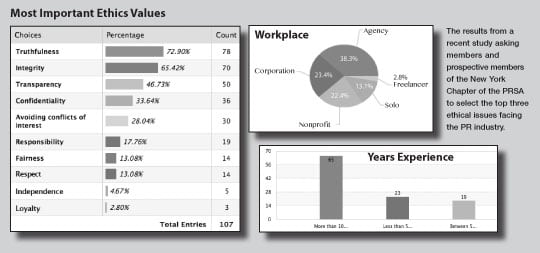
In a recent survey conducted on behalf of the New York Chapter of the Public Relations Society of America (PRSA) I asked members and prospective members to select the top three ethical issues in public relations from a list of 10 fundamental values. According to this (nonscientific) survey the overwhelming majority of the 107 respondents agreed that truthfulness, integrity and transparency were the top three issues. The results are not surprising and, in a way, reassuring. They give the impression that nothing can go wrong (ethically speaking) if we are truthful, if we behave in a manner consistent with our values and if we inform our constituents about whom we work for. However, life is never that simple. Living up to those values in our professional activities can be quite challenging at times.
Let’s look at these three values separately.
▶ Truthfulness. Telling the truth is not as easy as it seems. This is because at times we simply do not really know the truth and because at other times it seems that the truth does not serve our immediate best interest.
Ryan Holiday, in his book, “Trust Me, I’m Lying,” illustrates quite well why the public often mistrusts the public relations profession and its practitioners.
Here’s what he writes in the introduction: “If you were being kind you would say that my job is in marketing and public relations, or online strategy and advertising. But that’s a polite veneer to hide the harsh truth. I am, to put it bluntly, a media manipulator. I am paid to deceive. My job is to lie to the media so they can lie to you (the public). I cheat, bribe, and connive for bestselling authors and billion-dollar brands and abuse my understanding of the Internet to do so.”
He then proceeds to tell us in the next 238 pages of his book how exactly he does it or rather (let’s hope) how exactly he did it.
There is a very strong link between trust and truth telling. The words “you lied to me” carry a high emotional condemnation.
Lying is a form of betrayal because we live with the assumption that the “other” is telling the truth.
Trust is at the core of any relationship, whether personal or professional.
We would never take an elevator, ride in a car, or have an operation if we did not have a minimum of trust in the manufacturer of the elevator, the driver of the car or the man with the scalpel.
▶ Integrity. The word comes from Latin word, “integer,” which means whole, complete or one. The word has a noble resonance. A man or a woman of integrity is someone who keeps his or her word, whose actions are consistent with self-proclaimed values.
Again, it is not easy. The temptations are many to take shortcuts, to ignore that little voice inside of us (aka conscience) that says, “This is not right.”
But what does it mean to be of integrity in our professional reality? Let me list a few don’ts:
1. Do not represent a client who you do not trust or whose values differ dramatically from yours.
2. Do not represent a client who demands that you take action that is contrary to your values.
3. Do not intentionally communicate to the media (or to anyone) information on behalf of a client that you do not believe is true.
4. Do not make a promise to your client that you already know you will not be able to keep.
We all should aspire to act with integrity in all our dealings with colleagues, clients, the media and the public.
As we waited in line for coffee, I asked a colleague: “When you hear the word “integrity,” what first comes to mind? She did not hesitate much before she said, “My dad.” Wouldn’t it be great if someone pronounced our name when asked the same question?
▶ Transparency. The issue of transparency in public relations seems to be fairly simple. We should, basically, let people know whom we are representing [and] who are our clients or employers.
But that may be a very challenging value to uphold because it can often be in direct conflict with another important value, which is privacy.
How do we balance transparency with privacy or confidentiality? Where do you draw the line between being transparent and the need to respect the confidentiality of your client?
The issue becomes even more acute with the use of social media. Is it acceptable to blog under an assumed name? How much information about yourself should you post on your social media platform?
Let me list three questions whose answers might be helpful in resolving the transparency versus privacy issue.
▶ Who owns the information? I am considering making it public? Is it mine to give away? If it is not, then I am bound (ethically) to keep it confidential.
▶ What is my true motivation or intent in the action I am about to take? If my motivation can be justified ethically, I can most likely move forward.
▶ Am I being deceptive or misleading?
Most of us want to be ethical in our private and professional lives. Yet the challenges are many, and the situations where ethical rules guide us continue to evolve. Ethics is essential if we want to maintain relationships of trust with our fellow humans. PRN
CONTACT:
Emmanuel Tchividjian is senior VP and ethics officer of Ruder Finn Inc. He can be reached at [email protected].
This article appeared in the October 7 issue of PR News. Subscribe to PR News today to receive weekly comprehensive coverage of the most fundamental PR topics from visual storytelling to crisis management to media training.

